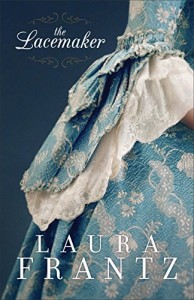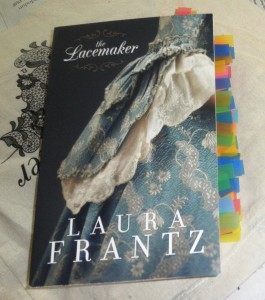 Laura Frantz’s THE LACEMAKER is set in 1775, pot-boiling days leading up to The Revolutionary War, when allegiances were strained and loyalties shifting. And Williamsburg, Virginia seems at the center of it all.
Laura Frantz’s THE LACEMAKER is set in 1775, pot-boiling days leading up to The Revolutionary War, when allegiances were strained and loyalties shifting. And Williamsburg, Virginia seems at the center of it all.
Into this turmoil Frantz drops Lady Elisabeth Lawson, dutiful daughter of the British lieutenant governor of the Virginia Colony. At her father’s arranging, Elisabeth is betrothed to a man of low morals and even lower integrity—a total rake.
As the story opens, Elisabeth is at the mercy of the decisions made by the men in her life, and I wanted her to stand up to them. When very soon, most of them prove their utter selfishness by abandoning her, she does set out to determine her own course, relying on naught but her own resources. But in this time of great uncertainty, she has no guarantee of success.
Frantz skillfully weaves history and story to bring this time alive for us. We have likely never lived in a time and place where one’s every move and word is watched, evaluated, and judged with life or death being the consequence. But just such immense stakes are the hinge of this story, so well told that we ache under the weight of each decision.
 This is one of Frantz’s most overt romances and it works very well. The object of Elisabeth’s affections, the master of Ty Mawr estate and Independence Man Noble Rynallt, is a hero beyond expectation! The barriers to any relationship for these two are huge. When they seem insurmountable, I expected to leave the story with only bittersweet memories and the echo of Anwylyd. But noble sacrifices, exactly what one expects from a larger-than-life hero, emerge out of nowhere and bring sighs and hope and, as Frantz always promises ~ hints of HEA (happily-ever-after).
This is one of Frantz’s most overt romances and it works very well. The object of Elisabeth’s affections, the master of Ty Mawr estate and Independence Man Noble Rynallt, is a hero beyond expectation! The barriers to any relationship for these two are huge. When they seem insurmountable, I expected to leave the story with only bittersweet memories and the echo of Anwylyd. But noble sacrifices, exactly what one expects from a larger-than-life hero, emerge out of nowhere and bring sighs and hope and, as Frantz always promises ~ hints of HEA (happily-ever-after).
I will happily read this marvelous story repeatedly. Frantz’s ability to paint with words introduces us to characters as if in person, presents scenes we can experience with all our senses, and plaits a story that wends its way into our hearts. I usually include snippets and gems to entice a review reader to become a book reader ~ but have heard that practice sometimes robs a reader from discovering jewels of her own. So I will limit myself to this one when Elisabeth is woken from a fretful sleep by a drunken, rowdy crowd. As the mob pillages her home, she learns she’s alone save two servants.
She sensed danger. For the first time in her sheltered, cosseted life, she felt it hovering like a dark presence … Papers lay like leaf litter … Moonlight spilled through shards of broken window glass … Elisabeth stood looking at her harp, the only thing in the music room that seemed to have withstood the night’s onslaught … carpet bore tar and feather boot marks. Both windows overlooking the garden were shattered … She kept her eyes on her instrument, lovingly counting the strings like a mother counted the fingers and toes of her newborn …The doorway darkened … Noble Rynallt’s searching stare seemed to strip away her forced composure … She felt as exposed as if she was in her underpinnings. Her humiliation was complete … There was a sympathetic light in his face … that drew her dangerously near the edge of her emotions. “This isn’t about you, you know,” he said quietly. “I know.” “I’m not the first to come.” … He was proceeding carefully. Did he sense she was as fragile as the broken glass all around them? … “No one offered you safe harbor?” “Nay.”
 Oh, Elisabeth, I want to hug you and walk you to a place of respite. Dear reader, don’t you?
Oh, Elisabeth, I want to hug you and walk you to a place of respite. Dear reader, don’t you?
Good stories are those where the characters capture us and compel us to join them on their journey. Frantz’s cast does that flawlessly. We have characters aplenty to root for, and many a scoundrel to cheer when calamity befalls them. For good or ill, we care what happens to these characters. I use flags to make finding favorite passages easy. My “visual review” to the right shows I heartily recommend THE LACEMAKER!
